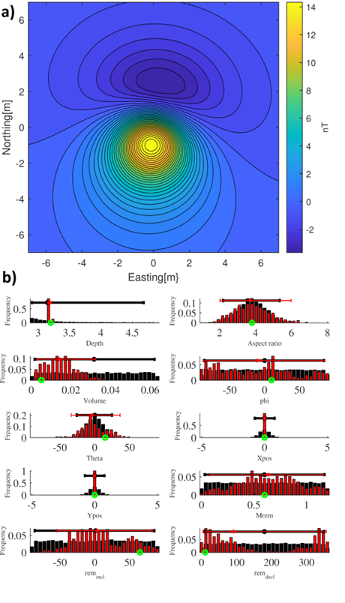A Probabilistic and machine-learning geophysical approach for characterizing potential Unexploded Ordnance: A Magnetometry based study in relation to offshore wind farms in the North Sea.
Previous work by Mark Wigh, Arne Døssing and Thomas Mejer-Hansen (paper in review in GJI) has proven the probabilistic approach for inversion of total field magnetic UXO data to be a feasible method for characterization and discrimination of UXO, however, with certain difficulties.
Magnetic remanence in UXO, data quality of the magnetic data and non-unique solutions remain to be addressed together with the implementation of historical data and other geophysical data, such as seabed bathymetry and shallow seismic.
These problems we intend to address in a variety of ways, which lays the underlying groundwork for the scope of the PhD project. The aim of the proposed PhD project is to improve prediction of (i) UXO size, shape and position as well as (ii) UXO versus non-UXO objects in magnetic surveying.
The focus of the project will be on total field drone-borne and marine magnetic data with the highest quality available in Ørsted’s database. New drone-borne high-quality data from an UXO imitation mine field in Jægerspris and from Hornsea II offshore windfarm in UK will be made available for the project. Additional data to constrain the inversion of real UXO (seismic, EMI, pictures/reports, historic data, etc.) will be provided by Ørsted.
The main objective of this PhD project is to create a Python-based software package that can handle large survey data sets in order to identify and characterize potential UXO targets and efficiently interpret the measured anomalies by assigning a given probability of (i) it being a non-UXO (metal trash) or - if being an UXO - then (ii) its size, shape and position.
The software will build upon the work and software described in Wigh, Mejer-Hansen and Døssing (in review), which was mainly developed as part of a temporary position for Mark Wigh at DTU Space in Autumn 2018. The software package will ultimately be able to use historical UXO data from a certain region as input to generate a “training set” that will be used to optimize the inversion process.

Main supervisor: Arne Døssing
Co- supervisor: Thomas Mejer-Hansen